“Ewurama, should we accept the gifts brought to us today?” Ewurama giggles and with a smile as broad as the morning sun, says a resounding “Yes Daddy!”.
Welcome to a scene from a traditional Ghanaian marriage.
The Ghanaian traditional marriage sometimes called “engagement” could be a stand-alone ceremony where the process is seen as complete in itself, or it could be followed with a “blessing” or a white wedding. How such a traditional ceremony is performed depends on the tribe the bride comes from, but there are some things that most tribes have in common.
What starts off the whole process however, is the groom informing his family that he has seen a lady he would like to marry. It could be that the lady is already known to the family or that could be the first time they would be hearing about her. With this information, the man’s family takes the next step of performing the “knocking” ceremony (kokooko). This is akin to someone knocking on the door of another person’s house to be welcomed in.
This “knocking” ceremony is done to inform the lady’s family officially of the man’s intention to marry her. The head of the delegation would use flowery language to describe their mission. “Our noble son here says he has seen a very beautiful flower in your garden, and he would like to ask permission to pluck this flower.” Such imagery shows that the groom is willing to do what is traditionally right by asking for the bride’s hand in marriage from her family. The “knocking” ceremony again serves as a chance for both families to be introduced to each other.
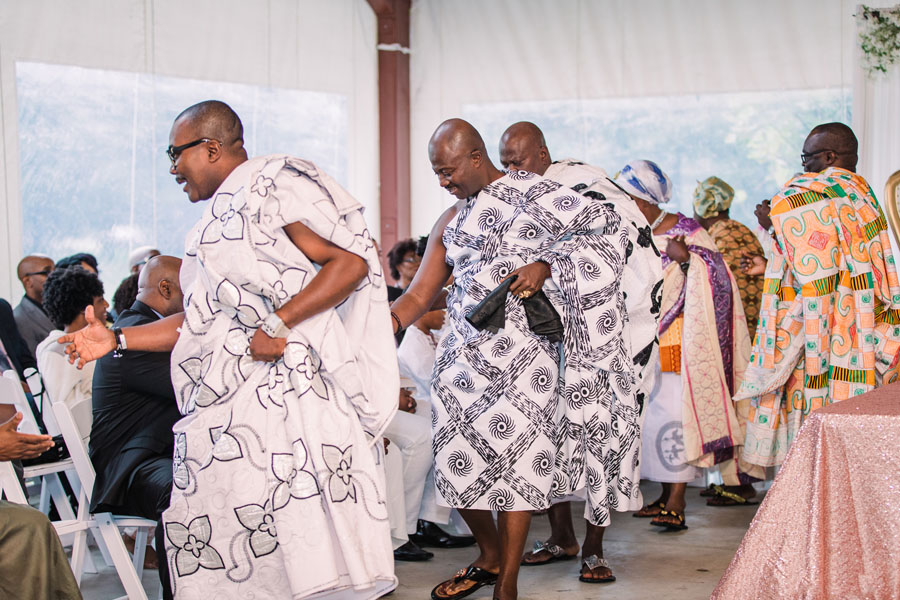
The family of the groom greeting the family of the bride
The man’s family would take along “tri nsa” (head drinks) – this could be two or three bottles of Schnapps, palm wine or cash. If the drinks are accepted by the bride’s family, the bride is asked to give her formal consent to the proposed marriage. When she does so, it means the knocking has led to the door being opened. A date could be set there for the traditional marriage to take place, or the couple will decide on a date at a later time. A marriage or “engagement” list is presented to the groom’s family. The list includes dowry / bride price, a new suitcase with pieces of African print, jewelry, Bible, rings money for the bride’s mother and father. Her brothers are not left out – they are also given some money (called “akonta sekan”) to thank them for protecting their sister.
Depending on the family one is marrying into, the list can be short and inexpensive or it can be long and cost-intensive and very daunting. Whichever be the case, the groom is expected to be in a position to provide all the items listed on the marriage list on the marriage day. Some families though, do not give out lists and rather ask that the groom uses his discretion to provide whatever he is able to, as they do not want to be seen as ‘selling’ their daughter.
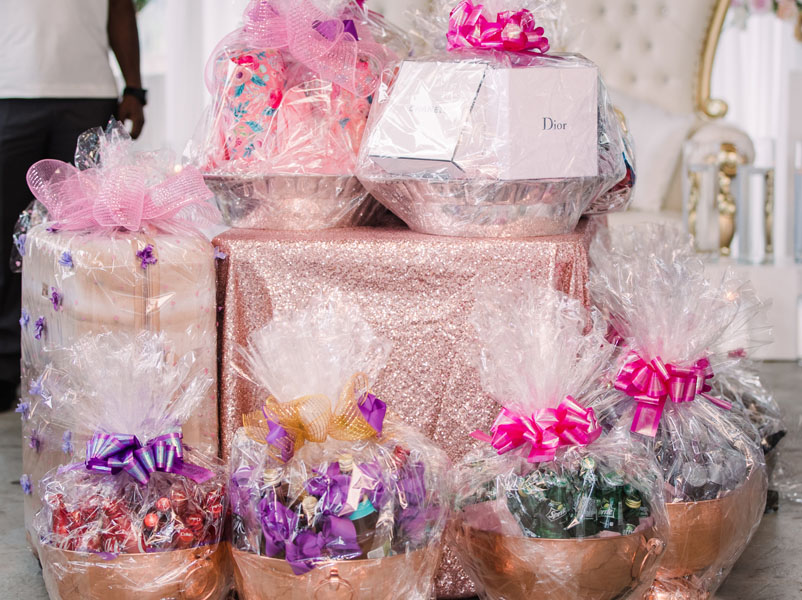
Gifts for the bride’s family
As preparations for the traditional marriage starts, the bride’s family does background checks of the groom and his family. Answers are sought to questions such as: Is the groom from a good family? Is there any history of strange or life-threatening illnesses in the family? Is there any record of criminal behavior? Is the groom being truthful about his marital status? When these questions are answered in a positive light, the marriage preparations can proceed smoothly.
Usually, the traditional marriage takes place at the bride’s home. Where that is not suitable, any other nice venue is chosen. Even before the ceremony kicks off, music and dance fill the atmosphere: be it music from traditional “adowa” groups or a live band, or music from a disc jockey, the atmosphere is filled with good cheer and joy.
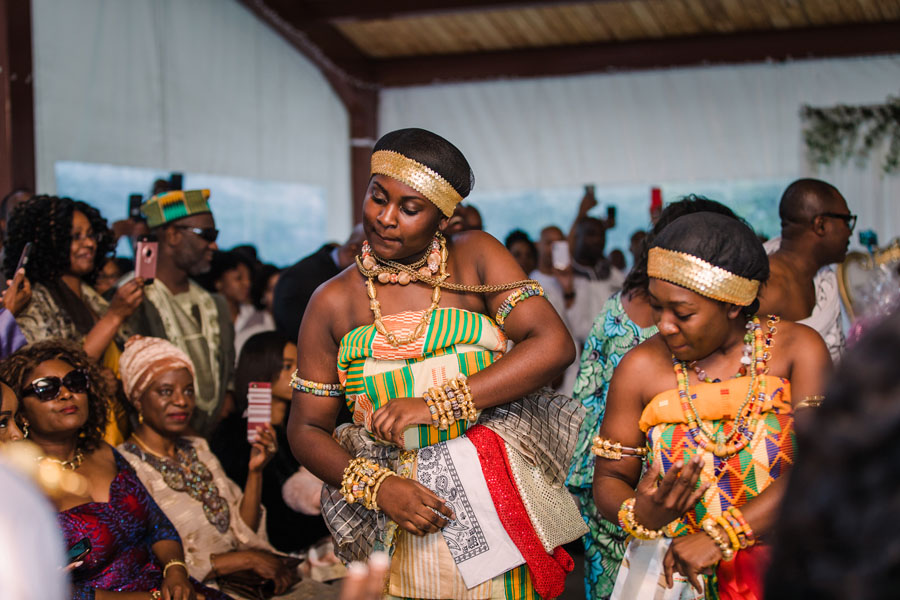
Ghanaian traditional dance – “Adowa”
The bride’s family gets seated to welcome the groom and his family. The groom and the family come in bearing the items on the marriage list. You will usually see a long line of family members beautifully attired, bearing the gifts in their hands or on their heads. The groom’s family is welcomed and the dowry and gifts presented. One person from each family will act as a spokesperson.
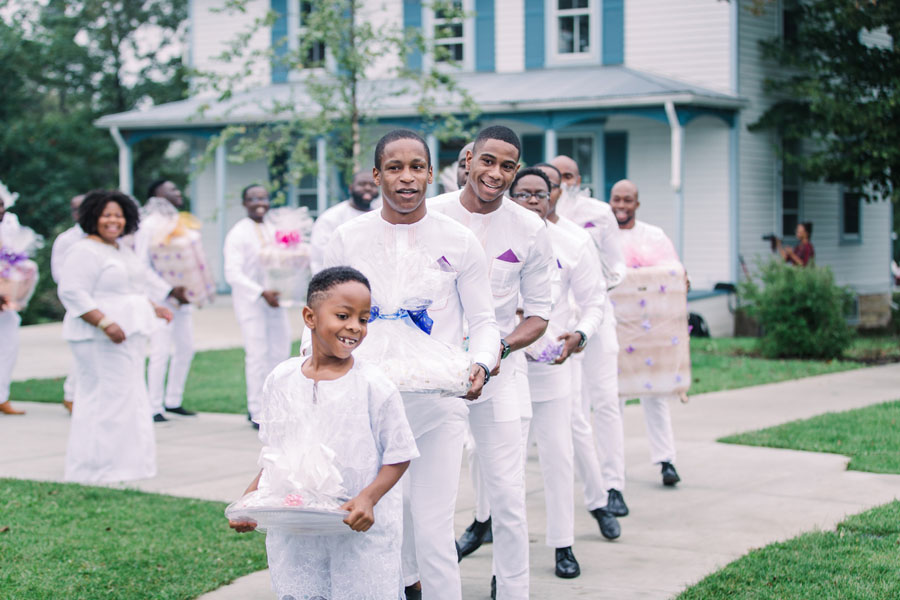
A long line of family members with gifts in their hands
After the presentation of gifts, the groom is introduced to all present. The bride is then invited in. She comes in with an entourage of her female friends or sisters, amidst music and dancing; beautifully clad in rich kente and adorned with beads – she is literally being paraded for all to see and admire her beauty. Most of the time, the groom and bride wear matching outfits. She goes round the room to shake hands with the groom’s family as a sign of welcoming them. She is then introduced to the groom’s family with a lot of accolades showered on her…”our pretty queen”, “our lovely lady”, “our well-groomed woman”, “the apple of our eye” etc.
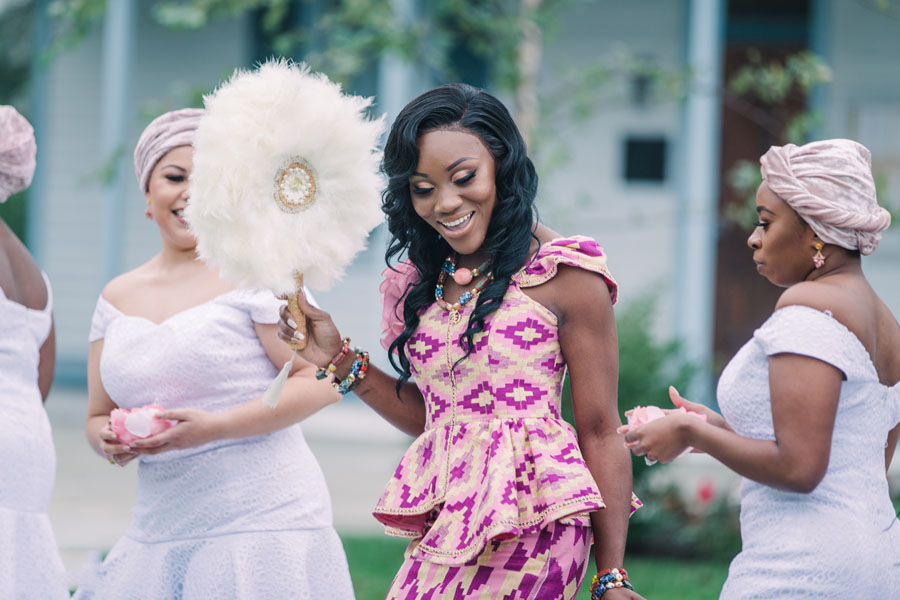
Bride dancing and making an entrance with her friends
After being introduced, she is asked if the gifts brought by the groom’s family should be accepted. She responds “yes”, and she’s asked again and again for the third time. This is to really confirm that the bride has agreed to the marriage. The bride is then presented to the abusuapanyin (head of family) of the groom’s family, asking that she be kept as good-looking as she is that day. The bride moves to sit with her groom. Pieces of advice are given to the couple – some humorous, some serious. As to be expected, the advice focuses on areas like household responsibilities, sex, finances etc.
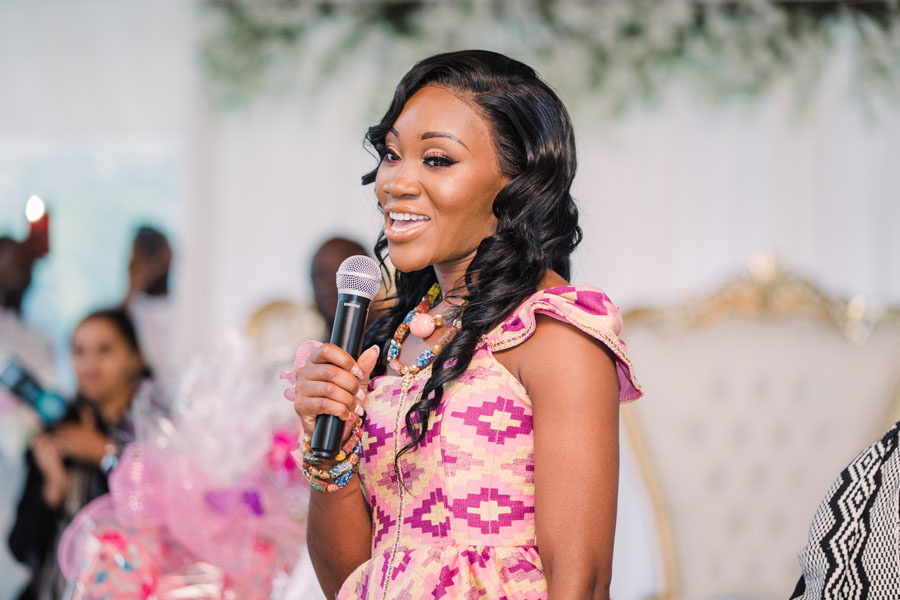
Bride says ‘YES’ to the groom and his family
The traditional marriage is customarily a complete marriage process on its own. However, for couples who choose to do a white wedding, the traditional marriage ceremony or “engagement” is not the final aspect of the marriage ceremony, the white wedding is. For most of such couples, the marriage certificate is signed at church or at a marriage venue recognized by the state. Another option would be for the couple to proceed to a court or a registrar of marriages to register their marriage under Ordinance.
Some Christian couples who decide not to have a white wedding opt for a priest/pastor being at the ceremony to pray over the rings and the marriage. This is referred to as “blessing”. For those not of the Christian faith, the “blessing” can be done away with.
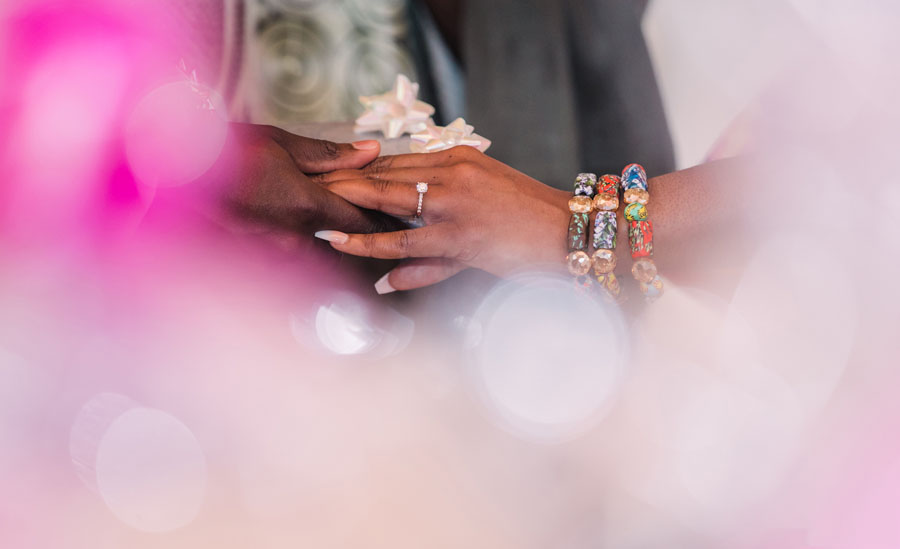
Exchange of vows
An assortment of dishes and drinks greets the eye, when the traditional marriage ceremony ends. Foods such as jollof rice, waakye, banku and okro stew, tuozaafi, kenkey and fish are usually on the menu. Guests are invited to indulge in the meals and make merry, amidst music and dancing. Wedding favors / souvenirs are given out, usually all customized: chocolates, pens, mugs, hand towels, bowls, flasks etc.
The bride and groom go round to greet their guests and thank them for being a part of their day.
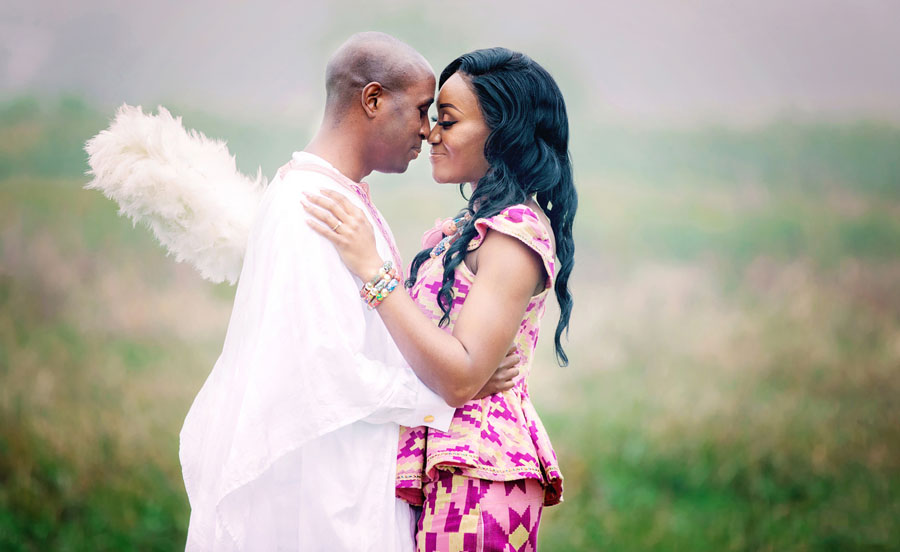
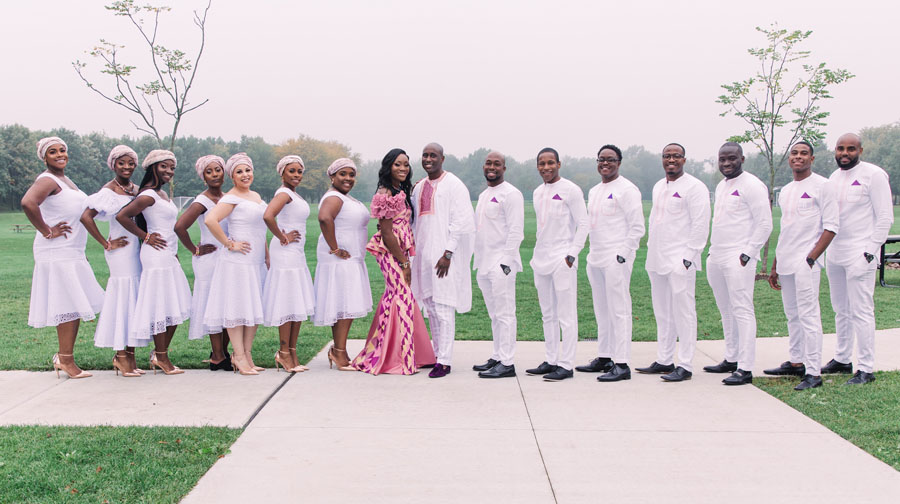
After all is said and done, the bride and groom can breathe a sigh of relief for a successful traditional marriage ceremony, witnessed by friends and family in an atmosphere of love.
Their new life together then begins…
Plan your wedding from the comfort of your home
©2025 — All rights reserved